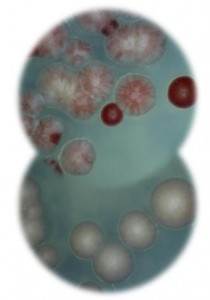 Prions are a remarkable type of disease-causing agent being entirely composed of protein. Nevertheless they are able to replicate themselves once in their host but understanding how they do so remains a major challenge. In a recent study published by Mick Tuite and his former PhD student Ricardo Marchante, the importance of so-called conformational flexibility of the prion protein has been identified as major factor in directing prion replication. Their studies on yeast prions, published in the June 6th issue of Molecular Cell, identify mutations in a yeast prion that impede replication by constraining the necessary flexibility of the prion protein.
Prions are a remarkable type of disease-causing agent being entirely composed of protein. Nevertheless they are able to replicate themselves once in their host but understanding how they do so remains a major challenge. In a recent study published by Mick Tuite and his former PhD student Ricardo Marchante, the importance of so-called conformational flexibility of the prion protein has been identified as major factor in directing prion replication. Their studies on yeast prions, published in the June 6th issue of Molecular Cell, identify mutations in a yeast prion that impede replication by constraining the necessary flexibility of the prion protein.
Paper: Marchante, R.M.N., Rowe, M., Zenthon, Howard, M.J. and Tuite, M.F. (2013) Structural definition is important for the propagation of the yeast [PSI+] prion. Molecular Cell 50: 675–685.
